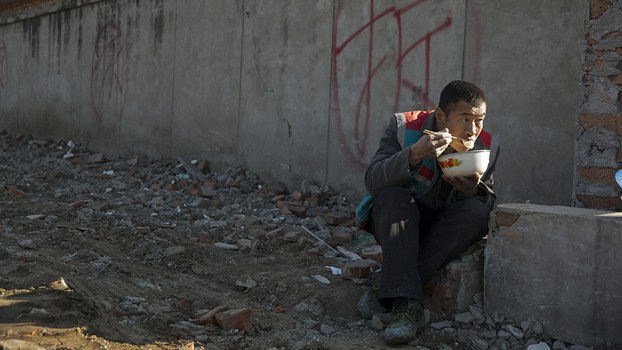Mass evictions, demolitions spread outwards from China's capital: Residents
| Publisher | Radio Free Asia |
| Publication Date | 30 March 2018 |
| Cite as | Radio Free Asia, Mass evictions, demolitions spread outwards from China's capital: Residents, 30 March 2018, available at: https://www.refworld.org/docid/5b2221c06.html [accessed 26 May 2023] |
| Disclaimer | This is not a UNHCR publication. UNHCR is not responsible for, nor does it necessarily endorse, its content. Any views expressed are solely those of the author or publisher and do not necessarily reflect those of UNHCR, the United Nations or its Member States. |
2018-03-30
 A worker eats his meal near a wall marked for demolition in Beijing, Dec. 11, 2015. AP Photo
A worker eats his meal near a wall marked for demolition in Beijing, Dec. 11, 2015. AP Photo
A mass eviction and demolition campaign aimed at removing low-income migrants from the Chinese capital appears to be spreading across the country, activists and local residents told RFA.
In a recent report to the municipal People's Congress, acting Beijing mayor Chen Jinning said the authorities have cleared some 40 million square meters of "illegal constructions" from the city last year, and will continue forced evictions of thousands of migrant workers from out of town.
Chen cited "coordinated growth" in the Beijing-Tianjin-Hebei urban area, as well as the city's hosting of the 2022 Winter Olympics as the main motivation for the policy, which includes capping Beijing's resident population at 23 million by 2020.
But other cities have since launched similar demolition campaigns on buildings they deem "illegal," often with scant warning and zero paperwork, residents told RFA.
Authorities in Nantong city in the eastern province of Jiangsu moved in with mechanical diggers to bulldoze the home of Zhang Ruying on Rengang St., Chongchuan district, in the early hours of Friday, razing it and several neighboring buildings to the ground.
Video footage seen by RFA showed the demolition work overseen by the city's urban management, or chengguan, law enforcement arm.
"At 6 a.m. today, while I wasn't home, hundreds of people surrounded our homes and destroyed them," Zhang, who was informed by neighbors of the move, said.
"The chengguan and other unidentified people were here, as well as the Rengang St. neighborhood committee," said Zhang, who said she received no warning whatsoever that she was about to lose her home.
"There were no notices [of any kind], not even a verbal notification," she said, adding that police and government officials had said there was nothing they could do, as the decision had been taken by the neighborhood committee.
A second Nantong resident said demolitions had also taken place earlier this week in Wenfeng sub-district.
"The government confirmed that a so-called unlicensed building was demolished," the resident said. "There was a dispute [with local residents] and so the government used this despicable measure . . . to put pressure on the other parties, who gave in."
Meanwhile, residents of Beijing say they are bracing for more forced demolitions in the capital.
Beijing resident He Kun said the clearances aren't being carried out within the framework of existing procedure, however.
"The only purpose of the new round of demolitions is to drive some of the population of Beijing out, and solve the problem of excess population density," He told RFA in a recent interview.
"But these issues aren't being resolved in accordance with the wishes of the people; it is for the ruling [Chinese Communist] party," he said. "It is totally unreasonable . . . neither does it conform to normal laws and regulations."
"It is law enforcement by violence."
'Something to say'
The clearances are also spreading outwards from the capital into neighboring Hebei province.
Anti-corruption campaigner Ma Bo, who lives outside Beijing's Sixth Ring Road, fears she too will soon be the victim of a new round of clearance operations.
"We can't rule out the possibility of demolitions beyond the Sixth Ring Road, because there are single-story buildings and shanty-town areas here," Ma said. "If there is a new round of demolitions, then ordinary people will have something to say about that."
"They have this idea that are going to drive out the 'low-end population,' although they don't mention the term 'low-end population' any more; they are still working towards that goal."
As rural residents are increasingly drawn to cities in search of low-paid labor to replace income from land lost to development, China's migrant population has risen in recent years to more than 200 million, nearly one-fifth of the population.
The resident population of Beijing has swelled by 59 percent since the start of the century, with an increase of 56 percent reported by neighboring Tianjin and a 50 percent rise in Shanghai.
The majority of migrants hail from the central provinces of Henan, Anhui and Hunan, while their top destinations are the rich coastal provinces of Guangdong, Zhejiang and Jiangsu, according to a map published last year by the search engine and online encyclopedia Baidu.
Reported by Gao Feng for RFA's Mandarin Service, and by the Cantonese Service. Translated and edited by Luisetta Mudie.
Link to original story on RFA website
